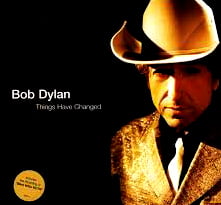
…I’m in the wrong town…. I should be in Hollywood….
If you strain your eyes hard enough at a Dylan performance, you will spot a small gold figurine wobbling on top of one of his band’s amplifiers. It’s there at virtually every gig. Dylan has even been known to grasp it and hold it aloof in apparent triumph during his po-faced Brechtian finales. The figurine is the Oscar Dylan won in 2001 for the song Things Have Changed from the film The Wonder Boys. As ever with Dylan it’s hard to tell whether he’s indulging in tongue-in-cheek self-mockery or whether he’s genuinely proud to have won the award. Perhaps he’s doing both simultaneously. His own creative contributions to cinema in directoral and screen writing modes – 1966’s jumpy, chaotic Eat The Document; 1978’s gloriously amateurish panorama Renaldo And Clara and 2001’s slyly political Masked And Anonymous – have been explicitly anti-Hollywood in style, following the dictats of the improvisational ‘hand held camera’ methodology of Francois Truffaut and the French New Wave ‘auteurs’ of the early 1960s (for whom Dylan has often professed great admiration) (see shot from Truffaut’s Les Quatre Cent Coups to right). Yet it’s also possible to trace a fascination with certain types of iconic Hollywood movies in Dylan’s work from the mid-70s onwards. The Desire album (1976) casts its protagonists as figures in various movie genres – Mafia epics, doomed adventure stories, murder mysteries, spaghetti westerns. 1985’s Empire Burlesque is liberally – if somewhat bizarrely – filled with snatches of dialogue from the films of Humphrey Bogart and others. The epic Brownsville Girl (1986) is a series of rumination centering around the Gregory Peck movie The Gunfighter (see above left) 1989’s Man In The Long Black Coat and much of the Under The Red Sky album (1990) are written like a series of cinematic screen directions.
Whatever his personal interests in ‘anti-cinema’, Dylan’s interest in generic Hollywood movies form part of his creative focus on how the essential cultural language of America is framed. These interests have lately manifested themselves rather differently. In recent years Dylan has contributed several songs to the soundtracks of various American movies. Some of these films were successful, others bombed without trace. Dylan seems to have treated these songs as specific exercises in writing about a particular theme. The songs often attempt to place the listener inside the mind of characters within whatever film Dylan is composing for. This series of essays, which is a follow up to the Modern Times Track By Track series that I’ve been putting up over the last eighteen months or so, looks at Dylan’s ‘soundtrack songs’ of the 2000s, examining how they relate to both the cinematic medium and wider contemporary concerns.
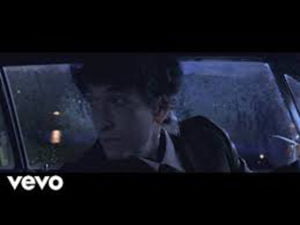
It’s a hot summer day in some anonymous American town. The Man Who Has Seen It All shakes his finger of XR Crown Royal lazily, watching the thick, translucent yellow liquid slide around the tumbler. Nothing sticks. He stares through the misty glass. Main Street is busy as usual. It’s rush hour now. Car drivers gnash their teeth as the purple fumes rise and horns blare. Behind him, the waitresses glide by almost soundlessly, dispensing coffee refills. He leans back in his chair. For just a moment he lowers his silver-framed reflective shades to watch one of the waitresses lean against the counter, filing her nails meticulously while staring off somewhere into space. She’s got a great ass, and she knows it. Maybe she catches his eye. Maybe not. The Man takes a deep breath and a gulp of whiskey. Behind the shades, his eyes show only resignation. What else does he have? Two divorces, three uncontested alimonies… A gleaming 1959-vintage Cadillac. A long-suffering lawyer, four healed-up gunshot wounds. And a woman who’s gonna take him for everything his has, who doesn’t so much suck his dick as suck out his soul. Of course, it wasn’t always like this. Yet… what you gonna do? There’d always been too much temptation at every crossroads…

 Things Have Changed was written for the 2000 film The Wonder Boys, directed by Curtis Hansen and starring Michael Douglas (right) as (the ironically named) Grady Tripp, a disillusioned middle-aged and formerly radical college professor whose personal and professional life has been plunged into turmoil. The film is a witty examination of the main character’s mid-life crisis, reflecting wryly on how he struggles to complete his latest novel while conducting an affair with his boss’ wife and struggling to contain his own excessive alcohol habit. There may well have been personal reasons for Dylan’s interest in such a story, if the autobiographical implications of songs of mid-life confusion like Standing In The Doorway and Trying To Get To Heaven (Before They Close The Door) on 1997’s Time Out Of Mind are to be assumed. By the time of Things Have Changed, Dylan – who had survived a life-threatening illness in the meantime – seems to have undergone a great uplift in spirits since the often dark soul-searching of Time Out Of Mind. Suddenly we were hearing a mischievous, giddy and joyously funny Dylan, the like of which we’d not heard for many moons. Things Have Changed’s sprightly tone anticipates the supercharged word games and sly postures of the next year’s Love And Theft. And its tone accurately reflects that of The Wonder Boys itself, which is a kind of comedy of modern disillusionment.
Things Have Changed was written for the 2000 film The Wonder Boys, directed by Curtis Hansen and starring Michael Douglas (right) as (the ironically named) Grady Tripp, a disillusioned middle-aged and formerly radical college professor whose personal and professional life has been plunged into turmoil. The film is a witty examination of the main character’s mid-life crisis, reflecting wryly on how he struggles to complete his latest novel while conducting an affair with his boss’ wife and struggling to contain his own excessive alcohol habit. There may well have been personal reasons for Dylan’s interest in such a story, if the autobiographical implications of songs of mid-life confusion like Standing In The Doorway and Trying To Get To Heaven (Before They Close The Door) on 1997’s Time Out Of Mind are to be assumed. By the time of Things Have Changed, Dylan – who had survived a life-threatening illness in the meantime – seems to have undergone a great uplift in spirits since the often dark soul-searching of Time Out Of Mind. Suddenly we were hearing a mischievous, giddy and joyously funny Dylan, the like of which we’d not heard for many moons. Things Have Changed’s sprightly tone anticipates the supercharged word games and sly postures of the next year’s Love And Theft. And its tone accurately reflects that of The Wonder Boys itself, which is a kind of comedy of modern disillusionment.
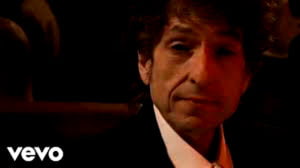
This new brightness (and lightness) of tone is immediately signalled by the attractive rhythmic shuffle, shaded by almost Latin percussion, which opens the track. For perhaps the first time in his career, and on the cusp of his own seventh decade, Dylan is finally making music you can dance to. With typical insouciance he even refers to this new musical ‘career’: …Gonna take dancing lessons/ Do the jitterbug rag… The voice here is a finely judged, gravelly whisper, which perfectly fits the tone and subject matter of the song, especially in the tiny understated sighs which he uses at various dramatic moments. Despite his professedly disenchanted situation and attitude, Dylan’s narrator seems to be somewhat detached from the events he’s describing. …I’ve been trying to get as far away from myself as I can… he tells us.
The song’s lyrics are sharply-honed with many delightfully ironic touches, none more so than in the description of the woman sitting on his lap drinking champagne. …Got white skin… he purrs …got assassin’s eyes… / I’m staring up into the sapphire-tinted skies… Dylan’s tongue slides around the alliteration, positively wallowing in the delicious contrast in these lines. The narrator appears to be wealthy and ‘well-dressed’, perhaps a kind of ageing roué with a young, gold-digging beauty in tow. …I’m in love with a woman… he confesses later …that don’t even appeal to me… His mind is clearly elsewhere. Despite his wealth and power he is trapped. Unusually for Dylan, the song has a series of middle-eights, helping to lead in to the rather attractively catchy (and almost hummable) chorus. The lines in these sections seem to represent the narrator’s mind wandering off in strange directions. In the first one he pictures himself …Standing on the gallows with my head in a noose… which may be an ironic depiction of the trap he’s got himself into by following a debauched, unfocused lifestyle. …Any minute now… he breathes in that understated growl …I’m expecting all hell to break loose… , though he hardly sounds like he’s getting himself into a sweat over it. The ‘singalong’ chorus again indicates a narrator who is barely engaged with the world, suffocated by his own ennui. …People are crazy, times are strange… he tells us, with an air of passive acceptance. But then he proceeds to confess that … I’m locked in tight/ I’m out of range… He is a prisoner, it seems, of his own boredom. He knows he is trapped but cannot be bothered to do anything about it: …I used to care… he sighs …but things have changed…
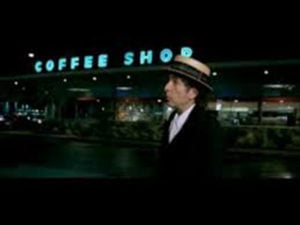
The next verse contains the song’s funniest lines. …This place ain’t doin’ me any good.. he muses. …I’m in the wrong town/ I should be in Hollywood… He’s hardly gained any sympathy from us so far, and this makes him sound even more comically decadent. It’s as if he’s leaning back on his bar stool, feeling maudlin, expecting us to give him some sympathy when he knows full well he doesn’t deserve it. In his misty-eyed, drunken reverie he seems to be indulging in some bizarre prewar Hollywood fantasy: …Gonna take dancing lessons, do the jitterbug rag/ Ain’t no shortcuts, gonna dress in drag… he declares, as if he’s banging his glass of bourbon down on the bar, expecting some bored waitress to sympathise with him. But then he begins to grow bitter. …Only a fool in here… he tells us …would think he’s got anything to prove… In the next middle eight he indulges in rather vague clichés about how life has passed him by: …Lot of water under the bridge, Lot of other stuff too… he says. Then he tips his hat to his imagined audience: …Don’t get up gentlemen… he insists (as if they would!) …I’m only passing through…
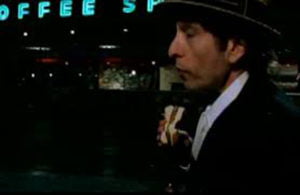
As our hero grows ever more maudlin the song takes a darker turn. Earlier on he had alluded to …waiting on the last train… Now he expands on this apocalyptic hint: …If the Bible is right… he sings …the world will explode… His drunken haze begins to lead him into darker moods and he seems to fear some kind of judgement from on high. Hell, it seems, is just around the corner. …Some things are too hot to touch… he mutters darkly. He begins to wallow in self-pity, confessing hat …I’ve been trying to get as far away from myself as I can… By the next middle eight he seems to have actually fallen right off his barstool. He adopts a tragicomic and rather ridiculous tone: …Feel like falling in love with the first woman I meet/ Putting her in a wheel barrow and wheeling her down the street… In the last verse he twists his tongue around lines that recall classic country ‘face in the beerglass’ laments: …I hurt easy, I just don’t show it/ You can hurt someone and not even know it… The logic of the coup-de-grace line … All the truth in the world adds up to one big lie… is similarly illogical and inebriated. Finally there is a random reference to …Mr. Jinx and Miss Lucy… who we are told …jumped in the lake… The narrator declares that …I’m not that eager to make a mistake… ‘Mr. Jinx’ was a ‘beatnik’ cat in Hanna-Barbera’s late 1950s cartoon Pixie and Dixie. But the narrator himself is, of course, a kind of ‘Mr. Jinx’. His life, he feels, is one long jinx.
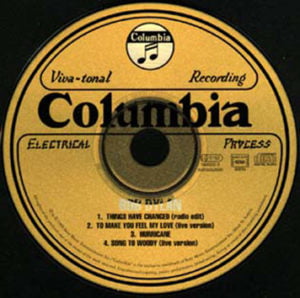
Things Have Changed comments rather obliquely on the character of Grady Tripp in The Wonder Boys. The persona Dylan adopts is, like Tripp, a drunken cynic who laments the death of his own morality With the apparently explicit reference to Dylan’s 1964 The Times They Are A-Changin’ in the chorus, it is tempting to think of him as an emblematic figure of our ‘modern times’. Yet the song is far from being the rantings of a cynical old man. It breathes with wit, with new life. Indeed it winks sardonically at the habit of false nostalgia. There’s actually nothing in the song that says that the narrator speaks from the present day. Maybe he’s in the 50s, or even the 20s, when you might well learn the ‘jitterbug drive’. The narrator is in some ways reminiscent of the Hollywood director Sullivan in Preston Sturges’ brilliantly satirical classic movie Sullivan’s Travels (1941), who attempts to ‘find out how the poor live’ by attempting to become a hobo himself, with disastrous results. Sullivan finds that escaping from Hollywood is no easy matter – for much of the film he continually finds himself landing back there. This ambiguity about where and when songs are set will be a strong feature of both Love and Theft and Modern Times. So Things Have Changed is a kind of manifesto for Dylan’s work of the 2000s, where ‘the future is only a thing of the past’. Freed from the shackles of the despair which he so memorably exorcises in Time Out Of Mind, Dylan puts on his snazzy dress suit and his dancing shoes to face the new millennium with a sly smile, a knowing wink and a twirl of his cane.
A different version of this text appears in DETERMINED TO STAND: THE REINVENTION OF BOB DYLAN
DYLAN LINKS
DAILY DYLAN NEWS at the wonderful EXPECTING RAIN
THE BOB DYLAN PROJECT- COMPREHENSIVE LISTINGS
STILL ON THE ROAD – ALL DYLAN’S GIGS
THE CAMBRIDGE BOB DYLAN SOCIETY


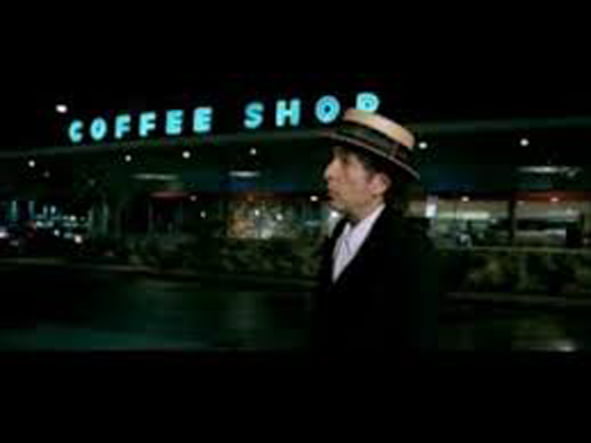
Leave a Reply